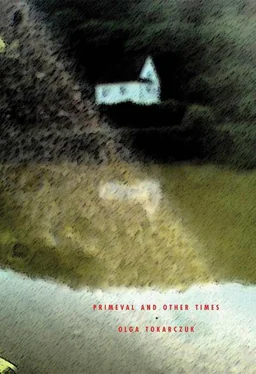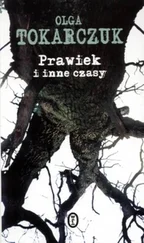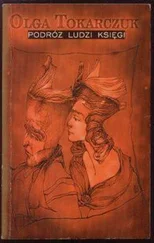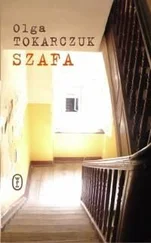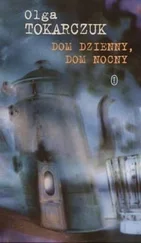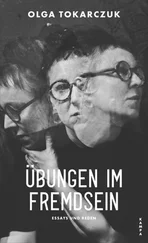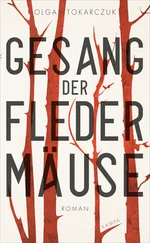Dipper wanted to romp and move about among all the human equipment, to make the world react to his presence. He wanted to control the air, stop the wind against his misty body, play with the shape of the water, beguile and frighten people, and startle animals. But the violent movements of air ceased, and everything became empty and silent.
He stopped for a while and sensed somewhere in the forest the diffuse, feeble warmth that people exude. He was pleased and began to whirl. He went back along the Wola Road and frightened the same dog again. Low clouds were trailing across the sky, which gave the Drowned Man strength. There was no sun yet.
Just by the forest something stopped him. He didn’t know what. He hesitated, then turned towards the river, not onto the priest’s meadows, but beyond, to Papiernia.
The sparse pine forest was smashed and smoking. Huge holes gaped in the earth. The end of the world must have passed this way yesterday. In the tall grass lay hundreds of human bodies going cold. Their blood was steaming redness into the grey sky, until it began to go a crimson colour in the east.
The Drowned Man could see something moving among all this lifelessness. Then the sun broke free of the fetters of the horizon and began to release the souls from the soldiers’ dead bodies.
The souls were emerging from the bodies confused and stupefied. They flickered like shadows, like transparent balloons. Dipper the Drowned Man was almost as overjoyed as a live person. He headed into the sparse forest and tried to set the souls whirling, to dance with them, startle them and drag them after him. There was a huge number of them, hundreds or maybe thousands. They got up and wavered unsteadily above the ground. Dipper glided among them, snorting, stroking and whirling, as eager to play as a puppy, but the souls took no notice of him, as if he didn’t exist. They swayed for a while between the layers of morning wind, and then, like untied balloons, they soared upwards and disappeared.
Dipper couldn’t understand that they were leaving, and that there was a place you could go to when you die. He tried to chase after them, but they were already subject to a different law from Dipper the Drowned Man’s law. Deaf and blind to his courtship, they were like tadpoles driven by instinct, knowing only one direction.
The forest went white with them, then suddenly emptied, and once again Dipper the Drowned Man was alone. He was angry. He spun around and crashed into a tree. A frightened bird let out a shrill scream and blindly flew off towards the river.
The Russians collected their dead from Papiernia and transported them on carts to the village. They dug a large hole in Cherubin’s field and buried the soldiers’ bodies there. They laid the officers to one side.
Everyone who came back to Primeval went to watch this hurried burial with no priest, no words, and no flowers. Michał went, too, and incautiously let the gaze of the gloomy lieutenant rest on him. The gloomy lieutenant clapped Michał on the back and had the officers’ bodies taken to the Boskis’ house.
“No, don’t dig here,” asked Michał. “Is there so little ground for your soldiers’ graves? Why in my daughter’s garden? Why are you pulling up the flower bulbs? Go to the graveyard, I’ll show you other places, too…”
The gloomy lieutenant, always polite and courteous until now, pushed Michał aside, and one of the soldiers aimed a rifle at him. Michał moved away.
“Where is Ivan?” Izydor asked the lieutenant.
“Dead,” he said in Russian.
“No,” said Izydor, and for a moment the lieutenant fixed his gaze on him.
“Why not?”
Izydor turned and ran away.
The Russians buried eight officers in the garden under the bedroom window. They covered them all with earth, and once they had driven away, snow fell.
From then on no one wanted to sleep in the bedroom overlooking the garden. Misia rolled up the eiderdowns and took them upstairs.
In spring Michał nailed a cross together out of wood and erected it under the window. Then he carefully made rows in the earth with a stick and sowed snapdragons. The flowers grew lush and colourful, with their little mouths open to heaven.
Towards the end of 1945, when the war was already over, a military jeep drove up to the house, and out got a Polish officer and a man in civilian clothes. They said they were going to exhume the officers. Then a truck full of soldiers appeared and a hayrack wagon, on which the bodies removed from the earth were laid. The earth and the snapdragons had sucked the blood and water out of them. Best preserved were the woollen uniforms, and it was they that held the decaying corpses together. The soldiers who shifted them onto the cart tied handkerchiefs over their mouths and noses.
People from Primeval stood on the Highway and tried to see as much as possible over the fence, but when the cart set off for Jeszkotle, they withdrew in silence. Boldest of all were the hens – they bravely ran after the cart as it bounced on the stones and greedily devoured whatever fell from them to the ground.
Michał vomited into the lilac bushes. He never put a hen’s egg in his mouth again.
Genowefa’s body had frozen solid like a clay pot scorched in the embers. It was propped in a Bath chair. Now it was at the mercy of others. It was put to bed, washed, sat up, and taken out onto the porch.
Genowefa’s body was one thing, and Genowefa was another. She was stuck inside it, trapped and deafened. She could only move the tips of her fingers and her face, but she could no longer smile or cry. Her words, hoarse and angular, fell from her mouth like pebbles. Words like these had no power. Sometimes she tried to scold Adelka, who was hitting Antek, but her granddaughter didn’t take much notice of her threats. Antek took refuge in his grandmother’s skirts, and Genowefa could do nothing to hide him or even hug him. She watched helplessly as the bigger, stronger Adelka pulled her brother’s hair, and she felt a burst of anger that immediately died away, however, because it had no chance of finding any sort of outlet.
Misia talked to her mother a lot. She moved her chair from near the door to the warm stove tiles and prattled on. Genowefa didn’t listen very carefully. The things her daughter talked about bored her. She was less and less curious about who was left and who had perished, she didn’t care about the masses being said, Misia’s girlfriends from Jeszkotle, new ways of bottling peas, the radio news that Misia always commented on, her nonsensical doubts and questions. Genowefa preferred to focus on what Misia was doing and what was happening in the house. So she saw her daughter’s belly growing for the third time, the miniature snowfall of flour that fell from the pastry board to the floor as Misia kneaded dough for noodles, a fly drowning in the milk, a poker left on the hotplate that had gone red-hot, the hens trying to pull out bootlaces in the hall. This was the concrete, tangible life that was drifting away from her day by day. Genowefa saw that Misia couldn’t cope with the large house they had given her. So she dug a few sentences out of herself and persuaded her daughter to take on a girl to help. Misia brought home Ruta.
Ruta had grown into a beautiful girl. Genowefa’s heart ached as she looked at her. She watched out for the moments when both of them, Misia and Ruta, were standing next to each other – then she compared them. And – had no one noticed? – they were so alike. Two versions of the same thing. One was smaller and darker, the other taller and fuller. One had chestnut-brown eyes and hair, the other’s were honey-coloured. Apart from that, everything was just the same. Or so it seemed to Genowefa.
Читать дальше
